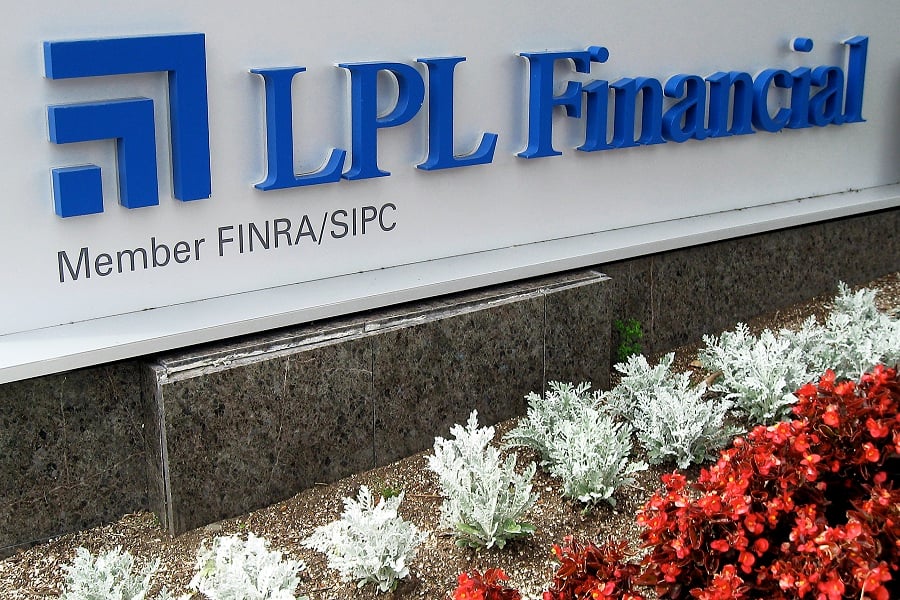LPL Financial Holdings Inc. could be in for a fight as it finds itself the target of an activist investor with a history of pushing for major reforms.
Marcato Capital Management, led by Richard McGuire, disclosed this week that it had accumulated a 6.3% stake in LPL, which owns the nation's largest independent broker-dealer. Analysts and industry observers speculate that Marcato could put pressure on LPL to make changes as it looks to boost the value of the company stock, which is down 25% from its high last year. In the same period, the S&P 500 was up 5.8%. The changes could include pushing for management changes, trying to drive growth by acquisition or even putting the company on the block.
“When you're a publicly traded company you can feel pressure from activist investors to take action, whether it's acquiring another firm or spinning something off or selling the company,” said Bill Butterfield, an analyst with Aite Group Inc.'s wealth management consulting practice.
Marcato, which has led activist campaigns at firms such as The Bank of New York Mellon Corp., where it called on chief executive Gerald Hassell to resign even as the stock performed well, confirmed in
a filing on Tuesday that it
could be looking into initiatives and having discussions with LPL officials.
“Shares are undervalued and are an attractive investment,” Marcato said in the filing. “These discussions may review options for enhancing shareholder value through various strategic alternatives or operational or management initiatives including, but not limited to, improving capital structure and/or capital allocation, M&A, asset allocation, and general corporate strategies.”
A spokesman for LPL, Brett Weinberg, declined to comment beyond a statement in which the firm said it maintains an “active and ongoing” dialogue with investors.
Mr. McGuire, who worked under well-known activist Bill Ackman, did not respond to messages seeking comment.
Marcato is already known among broker-dealers for having put pressure on another major player in the industry, Nicholas Schorsch, the former chief executive of American Realty Capital Properties Inc. In June 2014, Mr. Schorsch
said his company would slow its acquisition pace after Mr. McGuire sent a letter advising the company that it had engaged in “too many transformative transactions too quickly” and “should pause on large-scale transition activity.” At the time, Marcato held a 2.4% stake in ARCP.
Mr. McGuire also has lobbied for and successfully obtained a seat on the board at other major companies, such as NCR Corp., the ATM maker, in which Marcato took a 6.5% stake last year. He had been pressuring NCR to restructure its capital allocations as the company's stock was declining.
LPL's performance has lagged its peers recently as the company has paid tens of millions of dollars in fines from regulators over issues tied to supervision and alternative investments sold by some of its roughly 14,000 brokers. The firm's CEO, Mark Casady, said this summer that he felt that the end was near for the firm's regulatory issues, but last week the company paid another $3.3 million to settle with state securities regulators over allegedly improper sales of nontraded real estate investment trusts and leveraged exchange-traded fund products.
LPL has been taking steps to try and get ahead of possible regulatory issues. In July, it changed the rules for advisers who collect fees from family members' retirement accounts, which can be a gray area depending on how Labor Department rules are enforced. This month, it hired Emily Gordy, a former enforcement official with the Financial Industry Regulatory Authority Inc., to be deputy general counsel and oversee the regulatory inquiries and investigations group.
Apart from its regulatory issues, the firm's profit margins are low at around 4.2%, said Dan Seivert, CEO and managing partner at Echelon Partners, an investment banking and consulting firm for wealth managers.
“To be a public company you have to grow … it's all about growth,” he said. “There's a few ways Marcato could make good with their investment.”
The first is to try to drive new revenue growth by making acquisitions, he explained.
LPL has been
relatively cautious on acquisitions since its 2010 initial public offering. Its latest deal was an agreement to buy the assets of Financial Telesis Inc., a retirement planning broker-dealer in July 2014.
Second, migrating their business model from part-fees and part-commission to more of a fee-based business would also help add more stable revenue and help get ahead of possible regulatory changes, Mr. Seivert said.
“It's going to be hard for them to get more organic growth, but it's not impossible,” he said.
William Katz, an analyst with Citigroup Inc., said in a report that the company could focus on trimming expenses and trying to boost margins by cutting back, but that it would be a “somewhat nettlesome” proposition, given rising regulatory costs and factors such as the Labor Department's fiduciary proposal.
“So the question is whether LPLA may accelerate deals or become a sale candidate itself,” Mr. Katz said.
Mark Hurley, a co-founder of Fiduciary Network, which helps finance deals for registered investment advisers, said that the DOL fiduciary proposal, which could negatively affect the profitability of retirement plan business, could push the firm to “rethink their strategy” and look for a merger or acquisition to help drive growth.
“Whenever you have these changes that alter the model of any business, you see consolidation,” he said. “It's not a reflection of distress — it's more forward-thinking by management.”
Mr. Weinberg specifically declined comment on whether the firm could seek a buyer.
From a buyer's perspective, LPL could make sense to a major wirehouse firm looking to expand into the independent space or outsource its platform, according to Mr. Butterfield.
“It brings a different type of business model to their services,” he said. “And if a firm acquired LPL, they're not necessarily on the hook to keep all 14,000 advisers.”







